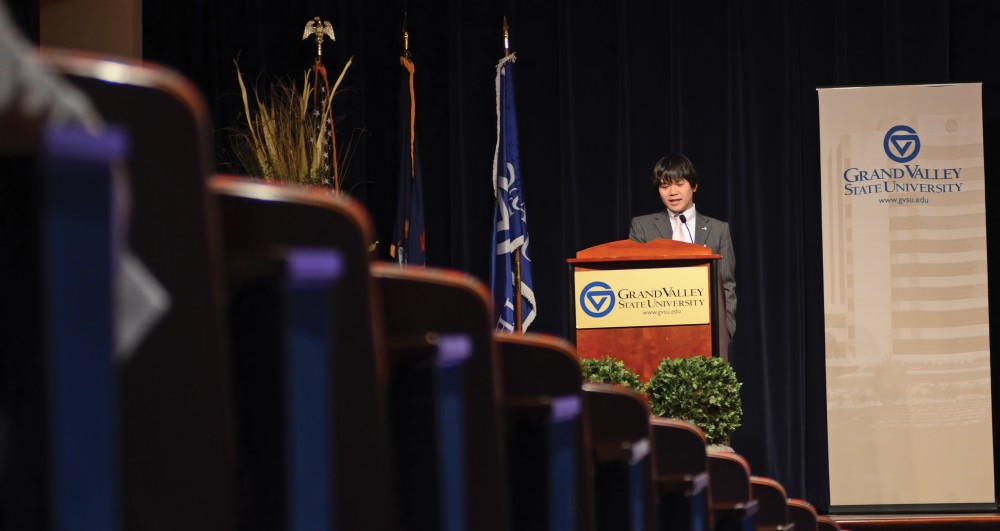Japanese Cultural Association hosts culture conference

GVL/Kevin Sielaff Kentaro Taki is the twentieth visiting official from the Shiga Prefectural Government in Japan; this past Saturday in Loosemore Auditorium, he discussed common differences between American and Japanese culture during the Michigan Japanese Heritage and Culture Conference.
Apr 6, 2014
The world continues to shrink. People today live surrounded by cultures and societies that once seemed impossibly far away. However, despite the intimate distance, many people still do not understand these other cultures.
With hopes of changing this, Grand Valley State University’s Japanese Cultural Association hosted the Michigan Japanese Heritage and Culture Conference held Saturday.
“We want to bring people together to appreciate Japanese culture,” said Bryan Gargano, the president of the JCA.
He also said he hopes the conference will raise awareness of the relationship between Japan and Michigan.
“Hopefully we can all come together more and more and bond over what we care about,” he said.
The four-hour conference had 12 speakers covering a wide range of topics including Japanese film, culture, the Otaku scene and current events. Kentaro Taki from the Michigan-Shiga Sister State Program kicked off the conference by relating his experiences coming to the U.S. He teased the audience with a brief look into life in the Shiga province and how it is different yet similar to life in Michigan.
“Autumn leaves are so beautiful, just like in Michigan,” he said.
He explained that Shiga is known as lake country because the province surrounds Lake Biwa, the largest lake in Japan and the third oldest lake in the world.
Taki said he is optimistic and excited about the future of Michigan’s relationship with Japan, and he believes language and culture barriers are obstacles that can be overcome.
“When my kids came to Michigan, they couldn’t speak English at all, but they found friends in three days,” he said.
Another speaker was Austin Knight, a psychology graduate from GVSU. Knight’s speech, “Is Japan Boring?,” raised the question of the entertainment value of Japanese media to American audiences. He said Japanese entertainment is a treasure trove of storytelling if Americans are willing to give it a chance, but it can be difficult to sell.
“In most American media, a character comes on screen and you understand them. In Japan, there is more development so you may not know what makes them interesting right away,” he said.
Knight urged the audience to give Japanese entertainment a chance and to keep an open mind.
Other speakers included Michiko Yoshimoto, the Japan Outreach coordinator at Western Michigan University who talked about Japanese college life, and Lamont Arrington, who discussed Otaku.
The JCA encourages interested students to join the organization and hopes to enlist enough Japanese enthusiasts to convince GVSU to create a minor in Japanese language and culture.






















